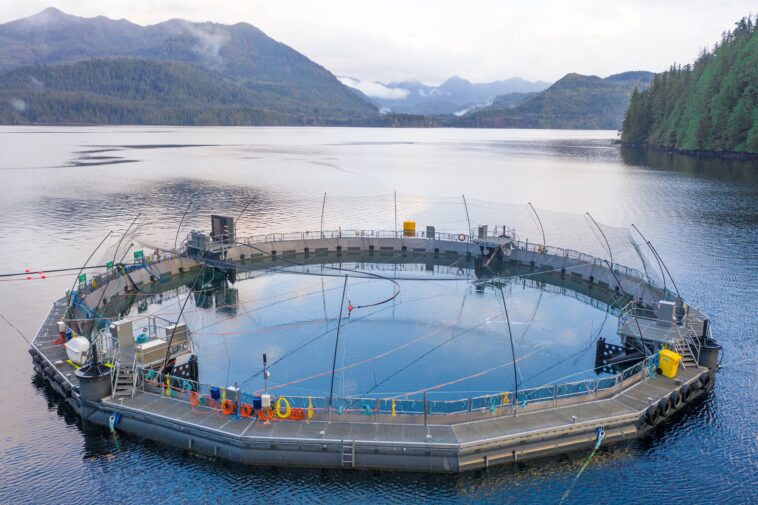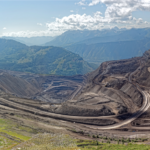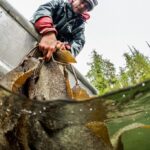Environmental advocates are voicing concern after Fisheries and Oceans Canada (DFO) recently released a proposal for new marine finfish aquaculture regulations in BC, including the extension of salmon farm licences.
Organizations like Watershed Watch, which advocates for wild salmon populations in BC, say the proposed licence changes are in conflict with the federal government’s promise to deliver a transition plan to phase out fish farms in BC by 2025.
Among the key proposals under review are extensions of finfish aquaculture licences from two to up to six years, alongside new measures to monitor and treat sea lice infestations, and bolstered reporting on the impact of fish farming on marine mammals like seals and sea lions.
Existing marine finfish licences in BC are two years long and are set to expire on June 30, 2024. The proposed changes are open for public feedback until March 8, 2024, and would be implemented in July 2024.
Scientists Concerned
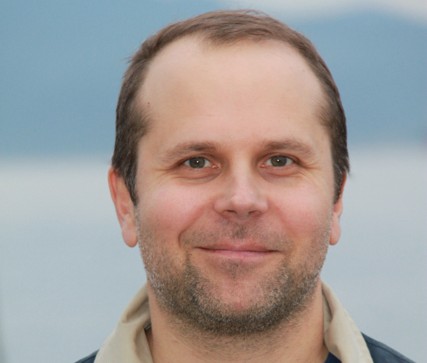
Stan Proboszcz, Senior Scientist at Watershed Watch Salmon Society, says the new licence proposal is concerningly out of step with the Prime Minister’s pledge to develop a transition plan to remove open-net pen salmon farming in BC waters.
“If we’re supposed to have a plan to transition from open nets by 2025, and we don’t have that plan yet, why are we even considering two to six-year licences when that would put us beyond that deadline?” he asked. “It’s putting the cart before the horse.”
Proboszcz said the existing precedent renews these licences on an annual basis, which is why the proposed figures of two to six years seem baffling. In response to the criticism, he said, DFO responded that if the licences are renewed, they could be withdrawn later. “But I do not believe that’s ever happened,” he told us.
“These two heads in the decision-making process, I’m not sure they’re really talking to each other. The [DFO], who’s responsible for doing all the leg work, really isn’t getting proper directives in relation to fulfilling this promise.”
Stan Proboszcz, Senior Scientist at Watershed Watch Salmon Society
He likened the DFO bureaucracy and Liberal government to a two-headed being. “These two heads in the decision-making process, I’m not sure they’re really talking to each other. The [DFO], who’s responsible for doing all the leg work, really isn’t getting proper directives in relation to fulfilling this promise,” he said in regards to the 2025 plan. “So they’re just kind of steamrolling ahead with what they’ve always done.”
2025 Pledge
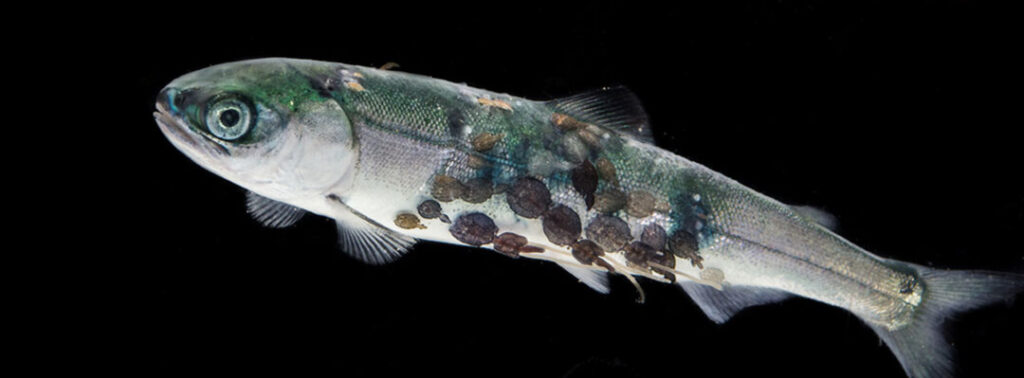
In 2019, the Liberal government committed to removing open-net fish farms from BC waters by 2025 out of concern for the health of wild fish populations. The decision was based on the scientific evidence that fish farms breed parasites and diseases that then transfer to the smolts, putting wild salmon populations at risk. When announcing the closure of fifteen fish farms in the Discovery Islands in 2022, former Fisheries Minister Joyce Murray stated that “wild salmon are in dire straits.”
The federal government has since postponed the 2025 closure commitment, saying it will instead have a transition plan for the open-net pen farms developed by 2025. The government is currently in the midst of consultations with First Nations, the aquaculture sector, communities, academics and conservation organizations.
“We want to ensure the new Minister of Fisheries and Oceans understands that there are 123 First Nations in BC that support the removal, that the broader economy of BC that relies on healthy and abundant wild salmon stand with First Nations in that support.”
Bob Chamberlain, Chair of First Nations Wild Salmon Alliance
However, many are already critical of the much-delayed transition plan. In September of last year, a coalition of First Nations, tourism stakeholders, and scientists called out the DFO’s lack of a proper transition plan and demanded the government move faster to enact its promise to close fish farms.
“We want to ensure the new Minister of Fisheries and Oceans understands that there are 123 First Nations in BC that support the removal, that the broader economy of BC that relies on healthy and abundant wild salmon stand with First Nations in that support,” First Nations Wild Salmon Alliance Chair Bob Chamberlain said at the time.
DFO Response
In an email to The Skeena, DFO wrote, “At this time, the Department is consulting on a licence duration of between two (2) and six (6) years. An individual decision is made for each licence.”
The feedback they receive from “consultations will be used to inform decisions on both licence reissuance and any potential changes to conditions with the goal of continued improvement in the management and regulation of the aquaculture industry in BC.” They did not comment directly about how this would impact the federal government’s earlier pledge to shutter open-net pen fish farming in BC.
In regards to the long-awaited transition plan, they reaffirmed they are in phase four of consultations with partners and stakeholders on the broader issue for a 2025 release. “No final decisions have been made at this time related to the Transition Plan,” they wrote in their email.
Murky Language
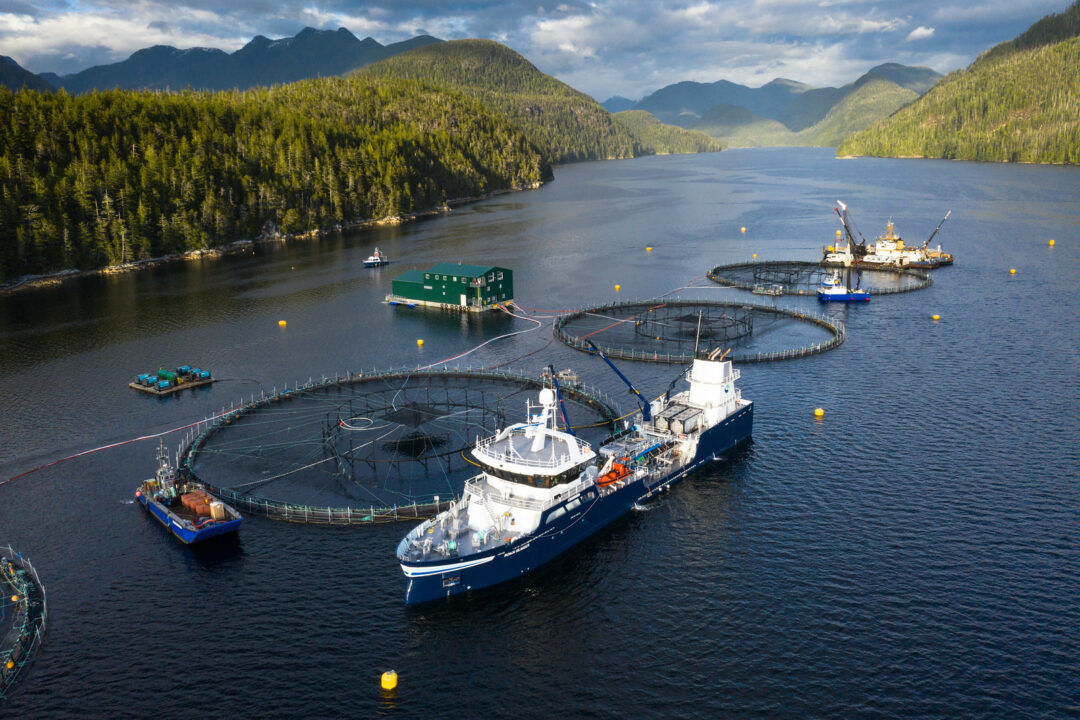
The weak commitment around the Liberal’s 2025 pledge was evident back in 2022 when Proboszcz filed an access to information request and obtained internal documents from Fisheries and Oceans Canada. Published in the Narwhal, DFO papers showed a subtle but intentional shift in language by government officials.
The initial promise from Trudeau was to “work with the province of British Columbia and Indigenous communities on a responsible plan to transition from open-net pen salmon farming in coastal British Columbia waters by 2025.” The new strategic documents revealed that instead, they were now working solely to “develop a plan by 2025,” and the wording of “transition from open-net pen farming” became “transition open-net pen farming.” The disappearance of the word ‘from’ was significant to Proboszcz.
“They removed that word ‘from’ in many cases, and so it was almost like a reinterpretation by the bureaucrats of the promise,” he said. “Then it appeared like they were starting to run with the new reinterpretation, like ‘let’s produce a plan by 2025 around transitioning open nets.'”
This strategic “tweaking” of language, he notes, is comparable to the “tweaking” of the conditions of licences from two to six years that is currently under consultation by the DFO. “They’re trying to really sneak it in there,” he commented.
This comes after DFO released a report in December that showed over 817,000 wild fish were killed due to open-net pen salmon farm operations near Tofino. Cermaq Canada – whose farming licences had just been expanded by DFO – was responsible for a significant number of these herring deaths through their farming activities in Clayoquot Sound.
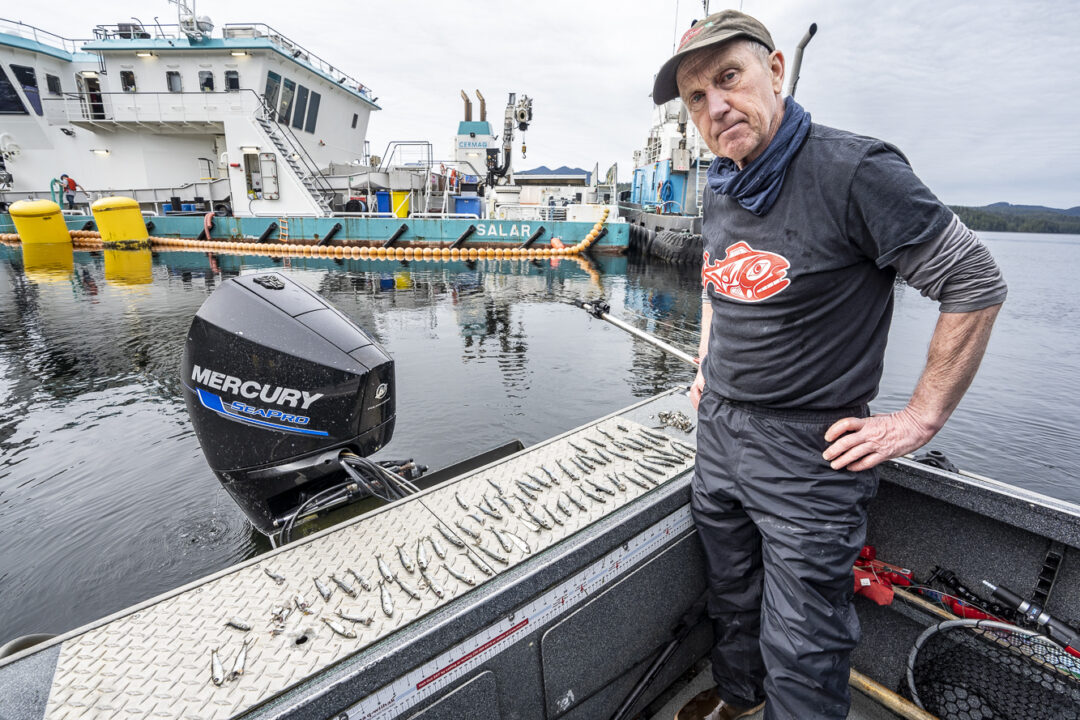
BC Premier David Eby said at the time, “Net pen fish farms, I think it’s safe to say the social licence for those that just sit in the ocean and cause the death of other fish in British Columbia, has expired.”
March 8th Feedback Deadline
Thenew proposal for farmed finfish licence conditions also includes stricter control of sea lice, so that all sea lice removed during hydrogen peroxide baths of the farmed fish are captured and properly disposed of at land-based facilities. Other recommendations include sharing information about new technologies, enhanced reporting on fish inventories, and increased monitoring protocol for megafauna, like entangled or dead sea lions and seals.
“I urge citizens that are concerned about this to send their own emails to the department.”
Stan Proboszcz, Senior Scientist at Watershed Watch Salmon Society
Yet these regulatory proposals may be overshadowed by the significant change in policy to extend the open-net pen licences from two to six years. “I think it’s really important for citizens to submit their comments,” Proboszcz said. “I urge citizens that are concerned about this to send their own emails to the department.”
The deadline for feedback on the DFO’s proposal is March 8, 2024, and members of the public can submit comments by email to [email protected].


